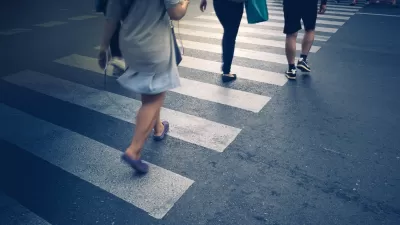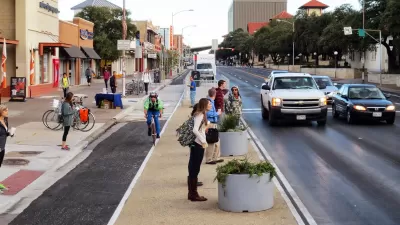As a leading cause of death in the U.S., car collisions are one of the country's foremost public health problems. But a review of the last century of medical literature reveals increasing reluctance by the profession to weigh in on the subject.
Angie Schmitt speaks with David Jones, the A. Bernard Ackerman Professor of the Culture of Medicine at Harvard, who "charted the fascinating historical trajectory of how physicians’ views on driving-related health risks have shifted, in an article that was itself published in the [New England Journal of Medicine] earlier this month."
Though the public health threat posed by automobiles was repeatedly debated by doctors in the first half of the 20th century, the subject waned in significance in recent decades.
For instance, "Despite an article in the most recent edition of the Journal finding that distracted driving is associated with significantly increased crash rates among both novice and experienced drivers, Jones says doctors still don’t seem to be comfortable taking decisive action to prevent these kinds of collisions," notes Schmitt.
So what's a proactive way that doctors could help prevent such collisions? Jones offers an example:
One of my colleagues, Amy Ship, who works at the Beth Israel [Deaconess Medical Center] in Boston, she said she routinely asks her patients, “Do you text and use cell phones while you drive?” If they say yes, she reads them the riot act. And it’s her opinion that all doctors should do that. What percentage of doctors ask patients about this? I bet it’s close to zero.
FULL STORY: What Should Doctors Do to Prevent Traffic Deaths?

Maui's Vacation Rental Debate Turns Ugly
Verbal attacks, misinformation campaigns and fistfights plague a high-stakes debate to convert thousands of vacation rentals into long-term housing.

Planetizen Federal Action Tracker
A weekly monitor of how Trump’s orders and actions are impacting planners and planning in America.

In Urban Planning, AI Prompting Could be the New Design Thinking
Creativity has long been key to great urban design. What if we see AI as our new creative partner?

Massachusetts Budget Helps Close MBTA Budget Gap
The budget signed by Gov. Maura Healey includes $470 million in MBTA funding for the next fiscal year.

Milwaukee Launches Vision Zero Plan
Seven years after the city signed its Complete Streets Policy, the city is doubling down on its efforts to eliminate traffic deaths.

Portland Raises Parking Fees to Pay for Street Maintenance
The city is struggling to bridge a massive budget gap at the Bureau of Transportation, which largely depleted its reserves during the Civd-19 pandemic.
Urban Design for Planners 1: Software Tools
This six-course series explores essential urban design concepts using open source software and equips planners with the tools they need to participate fully in the urban design process.
Planning for Universal Design
Learn the tools for implementing Universal Design in planning regulations.
Gallatin County Department of Planning & Community Development
Heyer Gruel & Associates PA
JM Goldson LLC
City of Camden Redevelopment Agency
City of Astoria
Transportation Research & Education Center (TREC) at Portland State University
Jefferson Parish Government
Camden Redevelopment Agency
City of Claremont





























